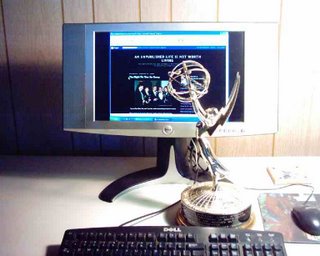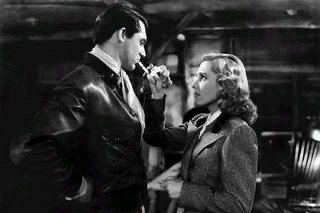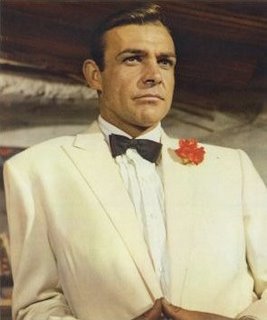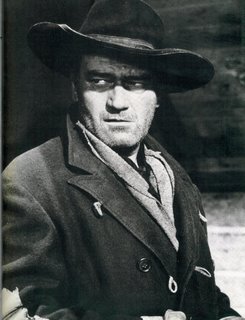 Dave, Ella, Mike, Yojimbo and Tom-The Audio Sweetening Team of Science
Dave, Ella, Mike, Yojimbo and Tom-The Audio Sweetening Team of ScienceMike wanted to throw up with every page turned in the program.
Since the category we were nominated for was the second-to-the-last one of the evening there were many opportunities to urp up the fine salmon dinner we had just had. Why do they serve a dinner at one of the most nervous-making things to sit through? Whose idea was that? It made for a long evening at the L.A. Hilton. It was the 1995-1996 Daytime Emmy Awards, and we were nominated for sound editing for "Bill Nye the Science Guy."
We knew we were going to lose.
All the signs were there.
First, we were hicks from podunk Seattle. As far as the television industry knew, we were still importing wives from Boston for our lumberjacks, spotted owl or no. We were not established in said industry, and we were affiliated with a studio not known for its TV work. It was, in fact, our first nomination. It was, in fact, our first television series. We knew deep down in our bones that we didn't deserve to be there. Confidence was "low." In fact, hiding under the table would have been appropriate.
Why were we even there if we thought the evening would end in defeat and humiliation? Hey, when you get nominated for an Emmy Award, you go. You have to see the elephant. You never know when a chance like that will come again. So, you go. You hope for the best, but expect the worst.
Don't get me wrong. I thought the sound for "Bill Nye" was good work. Even better, it was genuinely funny work. It was a struggle to crank out the dense sound mix that we did each week, and I had it in my head to try and present an original sound-scape for every episode--one that reflected the subject matter being discussed, something probably too subtle for the 12 year old target audience, but it was what I wanted to do. I thought by putting water sounds, rain sounds and splashes in a show about "The Water Cycle" would enhance the learning points of the show. And, after the pilot, I also wanted the show to have an anarchic "clubhouse" atmosphere, like the shows of my childhood idols, Soupy Sales* and J.P. Patches. So, to that end, there would be sonic "in-jokes" for regular viewers. I wanted to take the science seriously, but the host and his world...not so much.
By the time of The Night of the Sweat-Stained Tuxedo's, I had supervised 65 half-hour shows over a little under two years. The work was of generally high quality, but I'd watched my marriage come apart in the interim and I was battling depression.
I had also quit the show. After 65 episodes, I'd begun to think I was repeating myself and not bringing anything fresh to the show, and had moved out to Microsoft to create content for computers. I felt I'd left the audio in the more-than-capable hands of the ASToS. I would listen to their stuff and think that it was the best part of the job, having long grown tired of my contributions. Handing over the reigns was part of my duties that second year. I thought we'd done some terrific work the first season, but there wasn't a spark of interest in any awards. Probably nobody noticed. So I wasn't expecting anything for the second. I had done my best and moved on.
Then an early morning phone call came from Producer Hamilton McCullough. The show'd been nominated...for writing, editing and sound editing.
When they say it's an honor just to be nominated, it's never more true than when you're first told. You're pleased, you're proud.
And then the doubts creep in. "We couldn't win, could we?" evolves over a couple of months into "We couldn't win if we tripped over the statues in an L.A. back-alley."
There were other portents. We were up against "Flipper," a nationally syndicated show (with a very young Jessica Alba) produced out of Florida--at the time a popular spot for post-production (Disney had a unit out there and had been trying to convince the Nye producers to go there)--and as if that weren't enough, the weekend of the awards saw the premiere of "Flipper-The Movie" with Paul Hogan.
God was laughing at us.
That night, it seemed like the weight of the world was increasing exponentially during the awards ceremony. We were all there, sitting in the back of the Hilton auditorium. Ella had cut short a vacation in Vegas with her husband to be there. The men had rented tux's--you do that for the Emmy's.
As the evening dragged on, the writers for the show won "Best Writing for a Series." Then, the editors lost--a crime because the editors played an extremely creative role in shaping each Nye show.
That tore it: we would lose. What could you expect? We were losers. We should be happy they served us dinner and we had a nice bottle of wine. Plus, Katheryn and I were staying at a exceedingly plush five-star hotel downtown. We arrived at the ceremony in a limo. We figured "if we're going to do this once, let's live it up."
After all, we were going to lose. Dinner came and went. I grew more stoic and resigned to my fate. I had notes for an acceptance speech in my inside jacket pocket that I dashed off in three minutes. Wouldn't need 'em.
Our category was next and none other than The Science Guy himself would present it. He'd been by the table a couple of times to pump us up, even though we knew that, in a common phrase used on the set, we were "going to have our smokes crushed."
I took a deep breath and held it, a tight smile on my face. I looked across the table at Tom, ready to give him a sympathetic, supportive word when the inevitable happened.
"And the winner is..."Disney presents...Bill Nye, the Science Guy!"
I was looking at Tom, empathy at the ready, when his face exploded in shock. That's the only way I've been able to describe it. A split second from dejected to ecstatic. Klieg lights whirled to out tables, blinding us. Tom practically jumped around the table and started to sprint towards the stage. I sat disbelieving for a second. All I could do was follow. I started running, too.
I became aware of a looming presence blocking my path: it was Hamilton McCullough-always calm, always cool, always supportive. "Congratulations! You deserve it!" I grabbed his outstretched hand, babbled a thanks, and continued my serpentine run in the dark between tables to the stage. I don't remember being handed the award. I did have the presence of mind to open my wallet and slip Bill a ten. "Oh! Very funny!" he said. I walked over to the podium, and Bill and I did a quick search for the winning card. "You'll want this," he said.
People were still applauding. I started to talk with a warning that there was a lot to say, when I looked over at my colleagues beaming in the kliegs clutching their statues. I had to do it. "Ladies and Gentlemen, the Audio Sweetening Team of Science!" and I introduced each of them by name as the applause renewed. All those hours, all those nights working, putting sound effects in one at a time, all that effort to get everything done in five days to meet deadlines. I thanked everyone on the show, especially the creators, Jim, Erren and Bill, and I particularly thanked the editors for how they shaped the show. I remember being very proud of everybody. And very grateful.
Pictures. Lots of pictures were taken. We were over the moon. We marched, like an army, back to the place where Katheryn and I were staying and invaded the bar, which became full to bursting. But being a five-star hotel, seeing all the people and all the hardware, the manager improvised and within moments opened up a veranda for us and served us out there. It was a big, well-oiled, loud, laughing party. And why not? For us, the audio editors, for that one evening, we had been told by our peers that we were doing the best work in the country.** And no one could take that away from us.
At one point, I slipped away and found a phone booth. I called my mother. She was 79 and beginning to get a little frail. She had yet to be diagnosed with Alzheimer's, but all the signs were there if we'd chosen to recognize them. I was calling late. I knew she'd be in bed, but I had to tell her the news. It took awhile for her to pick up. "Hi, Mom! I won an Emmy!" She sounded a little muddled "Is that you?" "Yeah, Mom! I won an Emmy!" "Where are you?" "I'm in Los Angeles! I won an Emmy!" "You're in Los Angeles? When did you go?" "Friday. Just for the weekend. I won an Emmy!" "Well, that's nice." she chuckled. "You have a good time, and you come back safe." "Um, okay. See you when I get back." "Bye-bye, honey."
Click.
I wasn't disappointed she wasn't excited about it as I was. I mean, c'mon, you can't expect a 79 year old to go from unconscious to excited in 30 seconds (You could throw a rod or something!). But, if I was looking for additional approval that night, I didn't get it. Nor, I realized, did I need it. At some point in your life, as Mike Myers put it, you have to cash in your own chips. It's your life. You might as well enjoy it. But part of the job is to generate your own joy. And appreciate it when it happens. That's something else I got that night. And it's more than worth its weight in gold.
Or gold-plating.
*God bless the Internet. For all its faults and apocrypha, I can, at long last, show you what Soupy Sales was like back "in the day." Throughout production of "Bill Nye, the Science Guy" all I could do was inadequately describe the anarchy of his show, which was usually met with uncomprehending looks.
**It was just the beginning. "Bill Nye, the Science Guy" became an Emmy magnet. For the next four years, they would win in many different categories...including editing...and for sound editing every year, culminating, the last year, with the coup de grace -- Best Children's Series.
Next week: It's "Writer's Block" week. I take a break from publishing (but not writing, ironically--isn't this how "Moonlighting" got in trouble?) and offer up some audio-video from a favorite singer-songwriter. The quality-quotient can only rise.


















